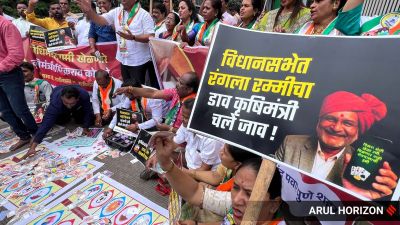Besides Chowdhury, the committee, headed by former President Ram Nath Kovind, includes Home Minister Amit Shah and former Leader of Opposition in Rajya Sabha Ghulam Nabi Azad. It will “commence functioning immediately and make recommendations at the earliest,” the Law Ministry said in a notification.

The other members of the panel are: former Finance Commission Chairman N K Singh, former Lok Sabha Secretary General Subhash C Kashyap, senior advocate Harish Salve, and former Chief Vigilance Commissioner Sanjay Kothari. Law Minister Arjun Ram Meghwal will attend the committee’s meetings as a special invitee, the notification said.
When contacted, N K Singh declined to comment; Azad, Kashyap, Salve and Kothari did not respond to phone calls or text messages from The Indian Express.
While Salve is an expert in constitutional law, Kothari was secretary to then President Kovind from August 8, 2017 to April 24, 2020, before being appointed as the CVC. Kashyap, former LS Secretary General, had supported the idea of simultaneous polls at a webinar organised by the BJP in January 2021. Singh, a 1964-batch IAS officer, who served as secretary to then Prime Minister A B Vajpayee, was appointed chairman of the 15th Finance Commission in 2017.
The committee comes two days after the government, in a surprise announcement, called a special session of Parliament from September 18-22 without citing any reason.
Stating that “…in the national interest it is desirable to have simultaneous elections”, the Law Ministry’s notification outlined a seven-point terms of reference for the panel.
It said the panel would “examine and make recommendations” for holding simultaneous polls to Lok Sabha, assemblies and local bodies, and propose changes in the existing law.
Story continues below this ad
The Constitution mandates a fixed five-year term for Lok Sabha and state assemblies. The high-level committee is tasked with proposing amendments to the Constitution, the Representation of the People Act, and rules under the law.
It is also required to examine if any constitutional amendment is required to be ratified by the states, and analyse and recommend “possible solution in a scenario of simultaneous elections emerging out of a hung House, adoption of no-confidence motion, or defection, or any such other event.”
The committee has also been asked to “suggest a framework for synchronisation of elections and specifically, suggest the phases and time frame within which simultaneous elections may be held if they cannot be held in one go”.
Crucially, the committee will also examine the modalities of using “a single electoral roll and electoral identity cards” for voters in elections at all three levels – Lok Sabha, state assemblies and local bodies. It will also “examine the logistics and manpower required, including EVMs, VVPATs etc”.
Story continues below this ad
On Friday, Union Parliamentary Affairs Minister Pralhad Joshi had said that the committee’s report would be discussed in the public domain and Parliament.
While addressing Parliament in June 2019, the then President, Kovind, had said that “one nation, simultaneous elections” was the “need of the hour”, and had asked MPs to seriously consider the suggestion.
In its manifesto for the 2019 and the 2014 Lok Sabha elections, the BJP had promised to work towards simultaneous polls. It had also said that it would work toward a common electoral roll.
In 2015, when a Parliamentary Standing Committee sought their view, the Opposition Congress, TMC, CPI and NCP, now part of the INDIA alliance, had all rejected the idea of holding simultaneous elections. The report said the AIADMK, AGP, IUML and the SAD had supported the idea.
With ENS









